
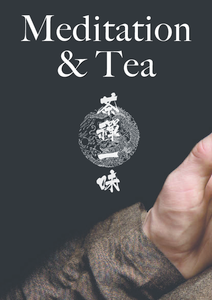 |
|
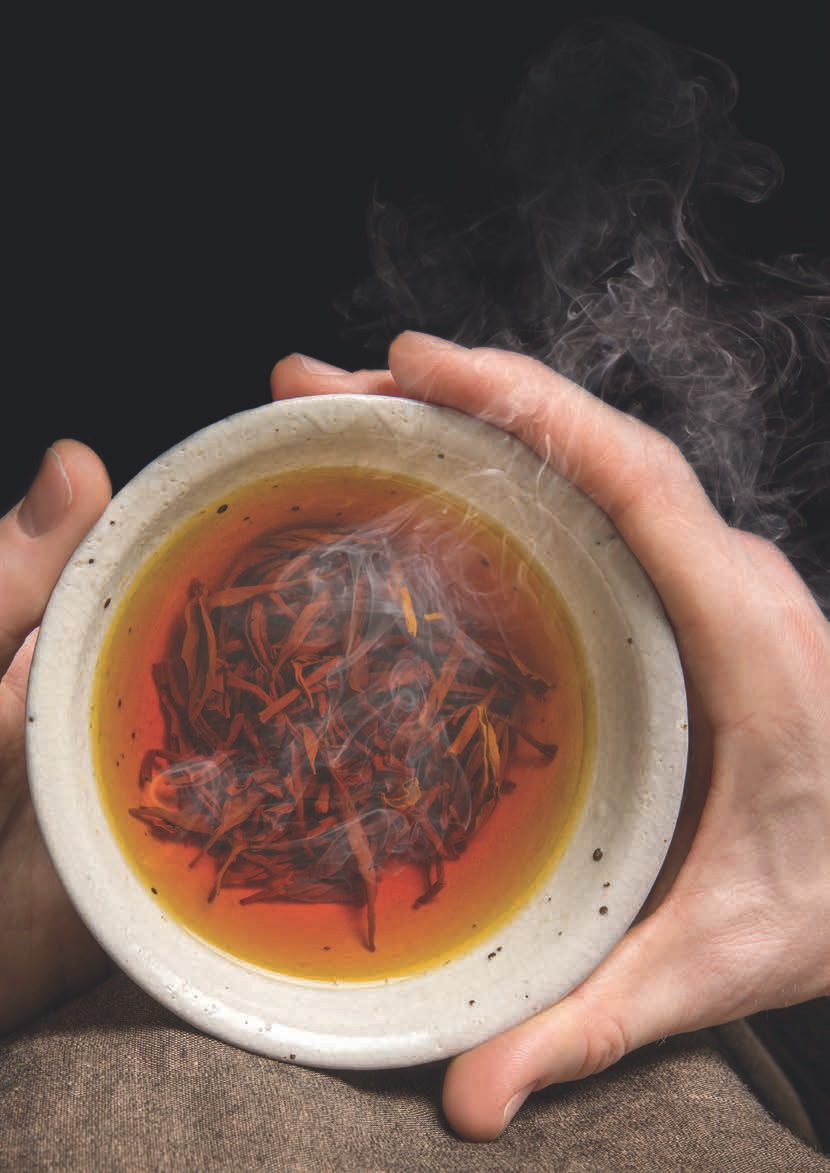
Meditation is the expression of our real selves, dignified and pure. Without periods of silent reflection, a life becomes a shallow pursuit of what can quickly become meaningless materialism. Nature itself alternates periods of activity with stillness. Learning to take the time out of each day and relax into a peaceful state where nothing is wanted or needed, where there's nowhere to rush off to and no baggage from where we've been can make all the moments of our lives more serene. Beyond that, it infuses us with the wisdom inherent in our quiet centers. This wisdom and inner goodness bring dignity and poignancy to the rest of our lives.
Once one realizes that tea can be an aid to this meditative stillness, all kinds of doors open. Many people initially find that just sitting and doing "nothing" is difficult, and finding the time is almost impossible. However, most people can quickly make a habit of enjoying some delicious tea each day. The connection with the senses and the enticing flavors and aromas, as well as the comfort tea brings to our bodies, can make the transition from our hectic daily lives to a quiet time much smoother. But how do we turn this act of tea drinking into something meditative?
Since ancient times the Chinese have focused their tea practice on extracting the highest quality nectar from the Leaf - the purest cup possible. In effect, they seek a dialogue between Man and Nature through tea, and emphasis is placed on the skill and mastery of creation, not the form or ceremony. In fact, constant adaptation and flowing with the changes that each tea brings are what gongfu, and this expression of the Dao, are about. The Japanese, on the other hand, used the repetition of the ceremonial traditions and the creation of the tea room and garden to achieve higher states of consciousness. There comes a time, however, in the learning curve of those committed to finding the best cup of tea, where one reaches the farther edges of technique. Eventually, one discovers the ideal cups, pots, Leaf and water as well as the skill necessary to combine them into delicious and rewarding cups of tea. Of course, you will spend your life improving these skills, and could spend many more lifetimes, in fact, but you will still wonder, "Where do I go from here? What new area can I improve in my tea practice?" At that point, we can look at any art as analogous to tea - whether it be music, painting or even athletics. One can master all the techniques involved in mixing colors, stretching canvas, drawing and painting to the point where one can create photographic representations of any scene on Earth, but that doesn't make one a Michelangelo. Similarly, one could master the guitar and all the technical skills necessary to play it, and then go buy the most expensive, clear-sounding guitar itself, but that wouldn't make one a Hendrix; or even in sports, learning all the skills needed to play a sport won't make you a master athlete. What is it, then, that takes these people beyond just the mastery of skill? It's simple: soul.
We all know and recognize soul when we see it: when we walk through a museum and certain paintings stand out to us as better than others; in our mother's cooking and the way it tastes better than the food prepared by master chefs at expensive restaurants; in our music, for, as Van the Man says: "Turn up your radio - turn it up, so you know it's got soul!" And this applies to tea as well.
When you reach that point where you're comfortable with your leaves, water and teaware, but you're still seeking higher and greater cups of tea, you will understand that the only thing left to change is yourself. In the same way that you experimented with different pots, waters, cups and kettles, you'll begin to experiment with yourself. My tea is much clearer and more delicious because I'm vegetarian, for example. Many tea lovers, past and present, have found this to be so. My body is lighter and cleaner and my senses sharper because of my diet. After all, we are consuming tea, so obviously diet is a factor. For now, this claim might be the same as someone saying that "silver kettles are much better"; in other words, it's just a claim. The point is that just as you experimented with kettles to verify such ideas, you will begin to experiment with yourself to see the ways in which your lifestyle affects your cup of tea, and the depth of the dialogue between yourself and Nature - the Leaf 's essence.
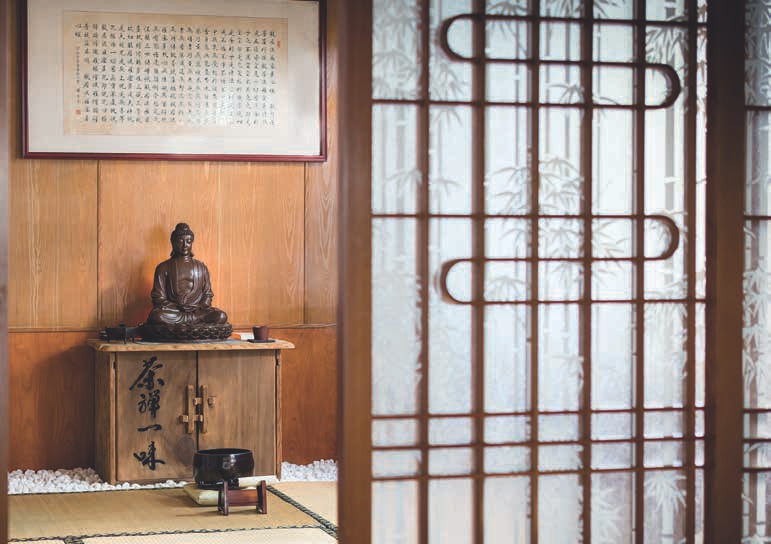
Gradually, we come to realize the importance of the mind of the one pouring, steeping and brewing as well as the mind of the one drinking the tea. We notice tremendous differences when separate people use the same teaware, water and leaves - and true understanding dawns. We now know that it isn't the "Cha" part of "Cha Dao" that is difficult, it's the "Dao." And that is where true cultivation begins.
The wonderful thing about tea is that it really is affected by the mind of the one brewing, and for that reason it has been the most important teacher in my life. If my mind is upset, if my body has toxins from eating poorly, if anything is ruffled, the tea will be different. In fact, as soon as one has achieved enough technical skill to gauge temperature and leaf amount, choose quality tea and teaware, etc., one quickly learns that the only aspect of the tea ceremony left to refine is oneself. The tea begins to talk to you, and the conversation always results in wisdom.
As mentioned above, one begins to notice the effect diet has on tea, for example. And the more one meditates with tea, the more sensitive one becomes and the more the tea itself rewards with deeper, more subtle flavors and sensations - in essence enticing one forward on the Path from the gross to the subtle. I practice a meditation technique that focuses on intense retreats to cultivate inner wisdom. We often meditate long hours. This slows down the metabolism and, combined with fasting, causes the body to store fat. This was fine when I was younger, but at the age of thirty - like many meditators in my tradition - I began to gain weight. I thought that being slightly overweight wasn't an issue, since the inner world was of much greater importance. I followed what I had been taught and put my focus on inner development, ignoring the issue. As years passed, though, my tea started to change. It took a while for me to notice, but I did eventually. It was showing me the importance of keeping physically fit as well - transcending what I learned from my teachers, even, and teaching me about myself, through my own being.
For centuries tea has been used in ceremonies. From weddings to funerals, and from initiation ceremonies to transmission of wisdom, people have used tea to convey non-verbal truths that words and ideas never can. Tea has sat between master and student for millennia. And there's an easy experiment you can do to understand why. It's really simple: in the middle of a session, switch brewers! Same tea, same water, same teaware, but different brewer. I am going to spoil the experiment and state the obvious (but you should still try it, in order to understand yourself - don't take my word for it!): The tea is very, very different. The heart-mind of the brewer influences the tea. This should come as no surprise. We can hand two different musicians the same sheet of music, and even the same exact instrument, and they will play two very different versions of the song. In art, the creation comes out saturated by the colors of our soul, like water passed through a freshly dyed cloth.
Once you understand that the brewer influences the tea more than the water, teaware or brewing methodology (not just because you read it here, but because you tried the experiment), then you can begin to understand why tea has been so important to teacher - student relationships throughout history. If the mind of the brewer is in the liquor, then what could be more poignant than for the student to literally and metaphorically consume the teacher's mind? There could be nothing more Zen. And this works the other way, too: the student makes tea and offers their heart-mind to the teacher, an acceptance of which symbolizes a taking of that student into the tradition.
The second foundation of transcending dogma, doctrine or philosophy is actually one of the most endearing aspects of tea. If you invite a Buddhist, Hindu, Christian and Muslim into a room to discuss their world views, chances are they will argue. But if they go into that same room to drink and discuss tea, they will emerge brothers. I have seen it happen! This is a huge measure of the gratitude I have for Tea: that I can express my heart free of any ideas or concepts. Language can be a barrier, because it represents ideas and concepts, so the listener/reader can either agree or disagree, believe in or not believe in the ideas expressed. As I write this article on Zen, I know that some of my readers will agree with it all, some will agree with a portion and disagree with other parts, while still others of you will disagree with it all. (You know who you are!) But when I make tea, I can express my heart free of doctrine or philosophy. And while you could say you don't want the bowl of tea I offer you, it would be absurd to say that you don't agree with or don't believe in it. You don't agree or disagree with a bowl of tea; you drink it! And that somehow makes it more real.
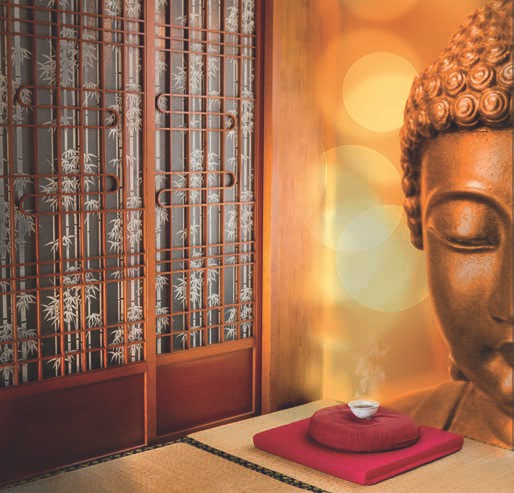
In the West, we often think of Zen as a kind of Buddhism. It can be thought of in that way, but it isn't just that. "Zen" is the Japanese word for the Chinese "Chan," which was pronounced "Tsan" in the south of China and then translated to "Zen" in Japanese. The word "Chan" is also a translation, so you actually have to follow the etymology back to Sanskrit to understand its essence. "Chan" is how the Chinese translated "Dhyana," which is best understood as "the meditative mind." It's actually deeper than that, but "meditative mind" will do. So "Zen" is the meditative mind. Besides the etymology of the word Zen, we can also look to the origin myth of Zen in order to further the idea that Zen is not just a religion or kind of Buddhism, but that, in its pure form, it is the meditative mind itself. Zen traces its origin back to a time when the Buddha held up a lotus instead of giving a teaching, and something unspoken was transmitted through that flower to his student Mahakasyapa, who was enlightened. (It is interesting to note that the Buddha also did not teach Buddhism. The word "Buddhism" was first used by a British author in the beginning of the nineteenth century. Asian society traditionally didn't have the strong sense of religious affiliation or identity that is prevalent in the West. Even today, people often see no harm in praying at Buddhist, Taoist and folk/Nature temples, as well as visiting a church on Sunday.)
There are four foundations of Zen, and in contemplating them, you may see why tea has played such an important role in the Zen tradition over the centuries:
Recently, I was chatting with my dear tea brother Matthew London, whose gorgeous photography has occasionally blessed our pages, about focus and devotion to one's art and practice. He had some brilliant insights, and I was left reflecting on them for most of the following week. Our conversation began because we both felt sad that focus and devotion to the mastery of any art seems to be growing rarer and rarer, so much so that the artists left committed to their practice are more eccentric than ever. The reason "Mr." precedes men's names is that it comes from the German "meister," which means "master," and back in the day everyone was a master of something (or striving to be) - master carpenter, master cobbler, etc. (And women were masters, too!)
"Almost all the progress in our world," Matthew said, with a sharp eye that intimated the embodiment of what he was saying, "has come because our ancestors were focused! They were focused on the stars for centuries, naming them all, and that led to astronomy. But nowadays we have sadly lost this focus, distracted throughout the day by so much media; distracted by too many thoughts about too many topics." I couldn't agree more. Concentration is a huge aspect of development in any field. It was one third of the Buddha's path to freedom. He used the ancient word "samadhi," which literally means a "one-pointed mind." The fact is that there is no skill without focus and concentration. And since we are positively oriented people, my conversation with Matthew very quickly oriented itself towards solutions to this challenge, and, of course, how tea could play a role in helping people to reduce clutter and focus their lives and minds.
As I reflected on the role that concentration and focus have had on the evolution of humankind and our civilizations, I discovered three areas of focus worth discussing: the mind, the life and the physical approach. I know that tea can help with all three because She has changed my life and the lives of so many others in these ways.
The first type of focus that tea affords is a focus of the mind: the ability to concentrate on one task at a time for longer periods. This is close to what the Buddha meant by "samadhi." Deep capacity for concentration and focus is the hallmark of a master. Look through pictures of any artist deep in their practice - making music, teapots, painting or any other work - and you will see the sharp fire of an intense focus. When we are young, we are taught that the best kind of concentration is strained and rigid, with clinched and furrowed brows. Students are rewarded for struggling to read. But the best concentration is actually relaxed while focused. If the body is soft and free, while being focused in laser-like intensity, then true mastery will follow. When you combine this ability with cultivated skills and knowledge, there is no limit to what humankind can do.
This ability to focus the mind is not just a tool for mastery of an art or skill, though it is necessary for that; it also has many deep, subtle implications. When complete focus of mind is achieved, there is a merging of the subject and object. Complete focus, in other words, is when we become the object of our focus. This is a state of "no mind" in Buddhist terms, or "effortless effort" according to the Daoists - a heart that is free to act without deliberation or hesitation. This is what athletes call "being in the zone." In such a state, you aren't there at all. There is no self, no thoughts or memories, drama or dilemma - only the action itself. The trailblazer and pioneer for Chajin like me, John Blofeld, says this more poetically than I can: "The use of a term meaning 'way' to describe the vast, unfathomable reality of which every form is but a transient manifestation has very subtle implications, pointing to the non-dual nature of reality; for, if reality is in fact non-dual, then the source, the way to the goal, the wayfarer, and the goal are all indivisible from one another."
The second kind of focus is a concentration of life. One of the reasons Matthew and I discussed as to why focus has been lost in the modern era is clutter. And with increased communication and transport, as well as constant innovation, there is a plethora of good options in any choice. More often, though, this clutters our life and prevents us from focusing on reaching the rich depths of any one practice. People today have access to dozens of beautiful and enriching practices, great products from around the world, etc., but this variety isn't always a good thing. It makes us tourists of everything and masters of none. We don't ever reach soul - the true core - of any art or practice, where a real transformation in our person can occur. Alan Watts often said that rich people don't want to take the years necessary to learn enough about sailing to actually enjoy a yacht, so they anchor them in the bay and have cocktail parties on deck. When you try to learn every kind of music, you may frustrate your ability to master any one of them. Or if you go to yoga on Monday, Sufi class on Tuesday, etc., you may not really delve into the true essence and benefit of any practice because your energies are too scattered.
Tea teaches us to simplify, to revere emptiness and ordinary space. Sometimes cutting things from our lives is not a qualitative decision. We aren't judging that which we are taking out. Rather, we are creating space to focus more and more deeply on one practice, relationship or area of our life. Focusing our lives on the things most important to us brings great joy. It is not the sacrifice you may be fearing; it is what you've always wanted.
The second kind of focus, reducing our life to what is essential, steeps into the third, which I call our "physical approach." You could say that focusing our life on our passions has to do with time and scheduling, while the third aspect of concentration on physical approach has to do with our space. Tea helps in this too, as it is a practice which is much more enjoyable in a conducive environment, which is ultimately a tea space that is clean and clear. The clutter of our schedule, filled with too many activities and not enough time to focus deeply on any one, also applies to our space. A cluttered mind will clutter the space, and then that space will inspire a more cluttered mind in a loop of increasing clutter. Living minimally in terms of one's physical approach to life will help you to focus you time and mind. It will also make your home much more conducive to tea. A tea space is best when it is empty and simple. This is very difficult to achieve, actually. But if you do, you'll find it a wonderful boon to your happiness and health. One of the main goals in building our future Center, Light Meets Life, is to keep the tea and teaware out of the tearooms, which will be empty canvases for students to practice chaxi and tea ceremony.
Before we move on to some practical tips for cultivating meditative tea, I'd like to conclude our discussion on focus by commenting that we also need to start reorienting our so-called civilization towards not just focus for its own sake, but focus on the right things. The Zen master Kodo Sawaki said, "People always talk about 'civilization,' but civilization and culture are nothing but the collective elaboration of illusory desires. No matter how many wrinkles of illusory desire we have in our brains, from the Buddhist point of view, they will never amount to meaningful advancement for human beings. 'Advancement' is the talk of the world, but in what direction are we advancing?" Can Tea help us re-orient our direction?
We have to start applying our focus towards closing separation, towards education and towards a love of the Earth, our home. Is technological advancement in weaponry really an advancement? Does the world really need yet another tea company profiting from inorganic tea that harms the Earth, the forest and mountain, the farmers and the consumers?
We do need to learn to focus our minds, lives and space to achieve any kind of skill (gongfu), but without the soul, skill is meaningless. The heart is what makes a skill valuable. There is an old Chinese story that demonstrates this quite well: a master archer was one day showing off in the town square, drilling arrows into the bull's-eye one after the other to the applause of a growing crowd. With deft skill he quickly nocked each arrow, hardly aiming at all. Each arrow he loosed whooshed and then loudly thumped right in the bull's-eye. The proud warrior's enjoyment of all the applause was, however, impaired by a simple oil vendor off to the side of the square who was, for all intents and purposes, completely ignoring the archer's display. After some time, the warrior couldn't stand this intentional snubbing and stomped over to the oil vendor's cart. "Hey, you! Can't you see what I am doing? Bull's-eye after bull's-eye - this is amazing archery. You haven't clapped even once!" The oil vendor looked up and responded with a quiet, "I'm not impressed," averting his gaze. "You're not impressed!" repeated the warrior with venom. "Nope, not impressed." The oil vendor saw the confusion on the warrior's face along with the threat and decided to explain a bit more: "Look, you just practiced archery for many years. This skill is the result of years of practice. Nothing more. Using your skill for show is not impressive." Deciding that the oil vendor wasn't worth the trouble, the warrior dismissed him with his hand, exclaiming, "Ahh, what would you know? You're just an oil vendor!" With a deft skill, the oil vendor reached down and placed on his counter one of the gourds which were used to hold liquid in those days. Then he placed a coin on the gourd's already small opening. (Chinese coins in those days were round with a very small square hole in the center.) With the grace of years of training, the oil vendor ladled oil and poured quickly and from on high through the small square and into the gourd - without spilling a single drop! He quickly capped the gourd and handed it to the now-agape warrior, declaring "On the house!"
What, then, do we mean by meditative tea? Meditation, in the West, is sometimes confused with contemplation. We don't mean that here. Meditation, in the Eastern sense, is when the distinction between the object and subject becomes fuzzy, the ground lost. You might say that only the object remains, but the words here force us into a paradox since there can't be an object without a subject. There aren't any good English words to describe the state, so perhaps it's best if we just use an Eastern one: Dhyana. "Dhyana" means "being-onto," so that when we are being-onto a flower, for example, the division between ourselves and the flower evaporates and there is only flower, though not the word. Understanding all this isn't really terribly important. Experiencing it is. But where to start?
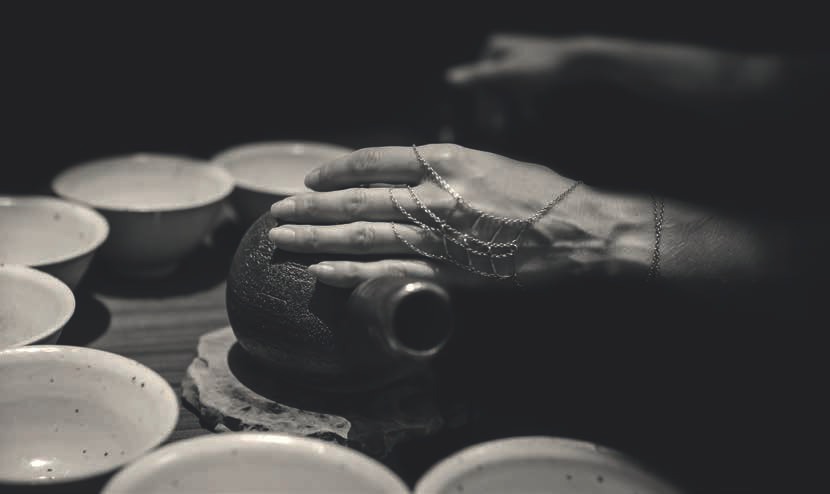
First, we must begin with our posture. So much of modern life slouches us: the sofa, food, the TV and games. We slowly hunch over like animals and lose the dignity of our upright posture. Beneath us the Earth is firm and holds us, no matter how heavy we are; above us, the Sky remains constant as well. Between it we rule. Try drinking your tea on the floor or a low table. Cross your legs and sit up nice and straight. When your spine is straight, you'll find meditation easier as well as your normal thought processes, and even perhaps your confidence in yourself. Dignified people don't slouch. Slouching is the sign of our mental impurities, like fear, nervousness or a lack of esteem. Try sitting at the tea table with a straight back.
One of the oldest methods of making tea into a meditation is listening to the kettle. This is another reason why using hardwood charcoal can add so much to the process of tea brewing. While your kettle is heating up, close your eyes and take some deep breaths. Try focusing on the area below your nostrils and above your upper lip. When your mind wanders, don't feel frustrated or rebuke yourself; just return to the breath. Slowly, your mind will begin to quiet down. Then, just as you find yourself settling into a stillness, you'll begin to hear the kettle like the "soughing of the wind through the pines." Try to learn to gauge the temperature of the water by this sound. Feel it; hear it in your soul. Don't make it an intellectual exercise. With some practice, closed eyes and a still, sensitive mind you will find that you can intuit the temperature very accurately in no time.
Nothing affects tea as much as the first time it meets the water. When the kettle finishes boiling, therefore, make sure your mind is at ease. If it isn't, rest the kettle aside and take a few deep breaths. Sometimes it helps to play soothing music in the background. I have found the flow of the water from the kettle, as it mixes with the leaves, significantly affects the flavor and power of the tea. Consequently, it's important to be calm, to breathe and let the water flow smoothly, like one's clear mind. Focus on the flow of the water and the steam; "be-onto" it - Dhyana.
Just as you learned to gauge the temperature of the kettle by the sound, eyes closed, you can learn to know when the tea is finished steeping just by quieting your mind and listening to your heart. Feel comfortable with your mistakes; as long as your posture is upright it is okay to misbrew tea. It can be a bit weak or strong. There is only one tea that is right for this moment, and that is the one before you - however it tastes. Let the parameters go, and achieve oneness with the tea and the process. Then, just as you were clear and focused when you poured the water from the kettle, you should be completely present for the tea as it is poured out. It will respond to your mind, pouring as smoothly or jerkily as you are clear or not.
When you smell and drink the tea, do so fully and completely. This requires silence, as does most every aspect of the tea ceremony. Allow your tea to reconnect you to yourself and Nature. Quietly sip it fully and wholly, remembering your posture and breath. When your posture is straight and your mind calm, you will notice so much more in your tea that you didn't before, subtler and subtler flavors, aromas and sensations in your body.
After you set your cup down, don't be so anxious to steep again. Don't bring the rushed mentality of your daily life to the tea space. Relax. You have more than enough time. There's nothing to do but be here and now with the tea. Close both your eyes and continue to breathe. When your mind drifts, just bring it back to your breath. You may notice the Cha Qi beginning to move in your body. Focus on your palms and extremities since the subtle sensations will often first become apparent there, as these areas are more sensitive. It may feel like a prickly, tingling sensation vibrating or moving in waves. Slowly, you will notice these sensations elsewhere the more tea you drink, especially when it's good quality tea.
Another great aspect of using tea as a meditation is the fact that you can always return to the present when your mind becomes unhinged. If you close your eyes and find your mind running away, and returning to your breath, the flavor of the tea or the sensations in your body all don't work to bring focus, you can always take 2 - 3 deep breaths and then steep the tea again, paying attention to the flow of the water from the kettle and repeating the whole process. It won't take too many rounds for even a disturbed mind to begin to calm down, especially as the essence of the tea wants you to be calm. Not only does it reward you with exciting new dimensions of flavor, aroma and Qi as you develop calm sensitivity, it begins to speak to you of Nature and the lost ages past.
A student of tea traveled many miles to meet Master Rikyu. He wanted to learn the inner essence of Cha Dao. When he arrived, he bowed before the master and told him of his long and arduous journey in the name of tea. Rikyu agreed to teach him and showed him to his lodgings. A few days later, after a particulary great tea session, the man asked the master, "Master, what is the inner essence of Cha Dao?" Rikyu smiled, "The highest truth of Cha Dao is this: gather water, lay the charcoal, heat the water and steep the tea." The man was shocked and began to question whether traveling all this way was worth it. Perhaps people had been wrong about this master. Giving him the benefit of the doubt, the man decided to ask for clarification, "But, Master, that is too simple. It would seem anyone could do those things." Rikyu scoffed; "The day you can do as I have said, I will travel all the way to your house, rest my head at your feet and become your disciple."
The meaning of this story is important, for it expresses everything we have been discussing. Rikyu was telling the student that the highest expression of Cha Dao is to gather water, heat it and steep the tea. Like the man, many of us might not understand why the master then said that he himself would become the disciple of anyone who could do that. The idea is that you just gather water and just heat it, and then finally you just steep the tea. In other words, there are no other thoughts, no ideas and no ego - just pure, enlightened action, called "wu wei" in Chinese. This is obviously no easy task, and will take a lifetime (or lifetimes) to master. The reason masters brew the best tea is because of their state of mind; and the reason tea was always so coveted by Buddhist and Daoist mystics is this very ability to transmit, along with its liquor, the state of mind of the participants, so that if one is deeply peaceful the tea will also be thus.
And the value of tea as a meditation isn't just for beginners looking to start finding quiet time each day. As we develop on the path, many meditators find that the time they spend meditating is often peaceful enough, but this doesn't always translate to daily life so well. Because you can "practice" peace at home on a nice cushion, with gentle music, etc., doesn't mean you'll be a Buddha when someone abuses you or behaves improperly. We are human. The world is full of negativity and it is often difficult to maintain one's equanimity. I have found that tea can help in this regard quite a bit.
At the Center, we meditate for two hours a day. The practice is ingrained. Most of the time, these two hours are enough. It is easy to find calm in the serene surroundings we have created in the Center. But how to bring this energy out into the world each day? It is easy to find peace with one's eyes closed and legs crossed, but what about when the hands are busy and the mind occupied? I have found that tea bridges this gap in an excellent way. It is in some ways an ordinary, daily activity - just drinking. But in many ways it is also a meditation, as we have been discussing here. You are moving and concentrating, coordinating the body and mind, but at the same time must seek the same kind of meditative stillness as is found on the cushion. Like tai chi or other moving meditations, tea helps to bring the wisdom of the cushion into more ordinary, daily moments of each day. I have found that this convergence happens much more often with tea in my life, and find myself meditative when brushing my teeth, for example, more often than before. In this way, everything becomes a part of practice.
Tea is an ancient and wise teacher. If we learn to quiet ourselves and listen to the Leaf, it has many things to show us about ourselves: our diet, our mindset, our emotions, even our cravings. It also can teach us about Nature and about the harm we are doing when we pollute it. It can discuss with us our own role in Nature and connection to it, not as external exploiters, but as part of a working ecology. Then, occasionally, there are those tea moments when all the elements come together and we achieve transcendence of ourselves. The ancient sages worked with the five elements (wu shing), trying to achieve external and internal alchemy, bringing Man, Heaven and Earth into proper alignment, not only to achieve a greater longevity of life, but also to cultivate wisdom.

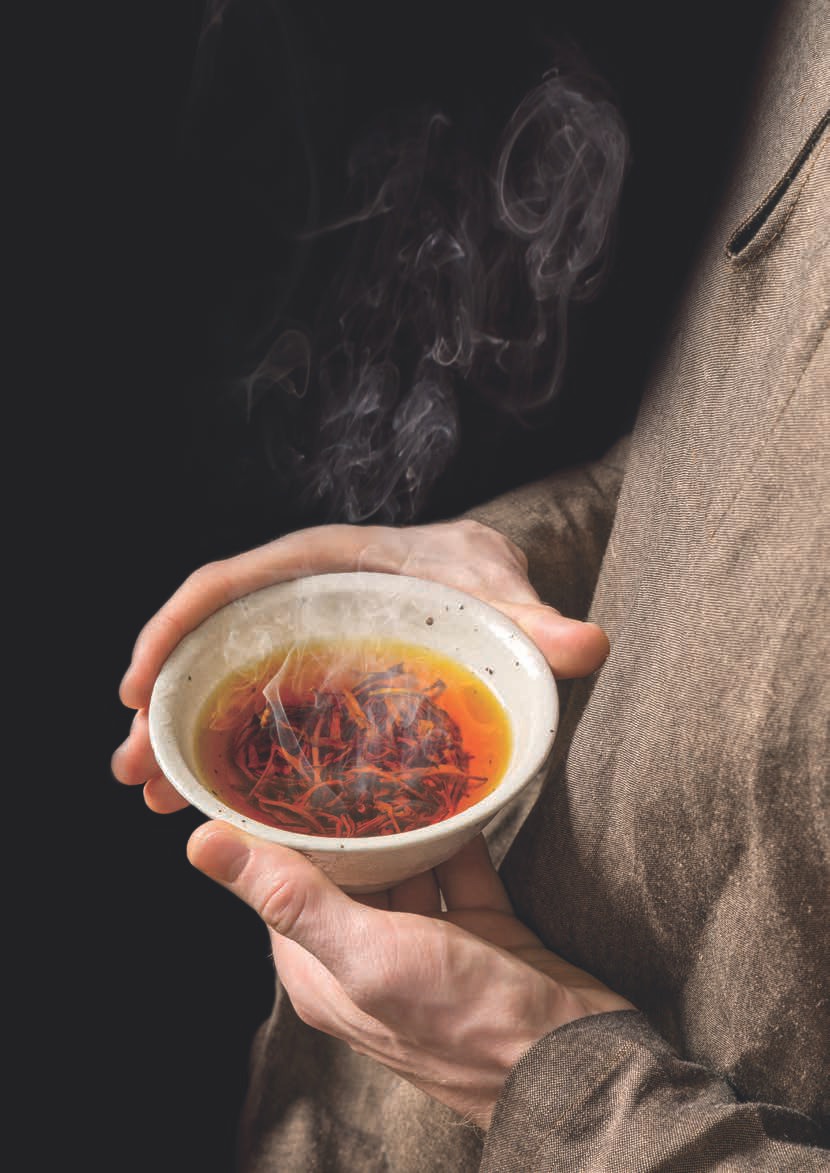
"Tea embraces the embodied paradox that we live moment by moment. There's no struggle, only calm joy arising from the recognition of the simple practice, which frees the mind into the heart - the expanse of being in the interior of our embodied experience. Apparent limitation, density, contraction and matter are seen as a continuum from tea cup to our lips, to our being. We flow from the finite to the infinite and back again, spiraling into presence through the simple act of bridging Nature into humanity - the meeting of all time and space in a simple cup of tea."